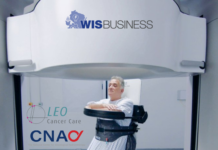The chair of UW-Madison’s Department of Engineering Physics says nuclear energy is at a “pivot point” as development progresses on new types of reactors.
Paul Wilson spoke yesterday during a Madison event hosted by the Customers First Coalition focused on new nuclear technologies. He highlighted the potential for small modular reactors, which are being advanced by a Portland company called NuScale Power.
He explained the “conventional wisdom” in the nuclear field has been that bigger projects produce electricity more cheaply.
“And that’s still true to a large extent, except that we’ve now grown to a size where the initial capital outlay is so large compared to what utilities can afford,” he said. “So now we’ve turned around and said, ‘Well maybe it’s not just the cost of electricity that matters. Maybe it’s the cost of the investment that matters.’”
Because the NuScale modular reactors are smaller, that means the initial investment required is much lower. Plus, a utility or energy cooperative can build its first reactor, begin generating revenue from that installation, and use those funds to pay for adding others within a single facility, he noted.
“The individual components are of a scale that they can be built in a factory and shipped to the site, so there’s much less onsite work to be done, and it’s more of an assembly operation than a construction operation,” he said. “That has important impacts for some of the job opportunities. It may mean that we want to be positioning Wisconsin to be a place where we have those factories.”
Also during yesterday’s event, the head of generation and power supply for Dairyland Power Cooperative said the organization is exploring the possibility of using small modular reactors to generate energy for its customers.
Jeremy Browning said the La Crosse-based co-op is committed to energy safety, reliability and affordability, and sees this new technology as a “viable option” that can meet those standards. Dairyland plans to conduct a site study this year to evaluate costs and viability.
“Your objective there is to find a place that is the most economically viable and safe to build the facility,” he said. “There’s a lot of things that go into the construction of one of these facilities. If you select the wrong place, you can be talking a lot more cost.”
Both Browning and Wilson spoke to the uncertainty around operating costs for these smaller reactors, but their modular design could help speed up the process of improvement.
Wilson said a “very well-built” small modular reactor could be slightly more expensive to operate than a very large reactor, noting “certainly the first ones will be.”
“One of the real opportunities, though, is the opportunity of learning by doing it many times … A company can build one, learn from it, build the next one. And there’s a much better opportunity of learning by doing,” he said.
Watch the full event here: https://wiseye.org/2023/04/13/customers-first-coalition-the-nuclear-option-new-technologies-new-opportunities-for-wisconsin/






